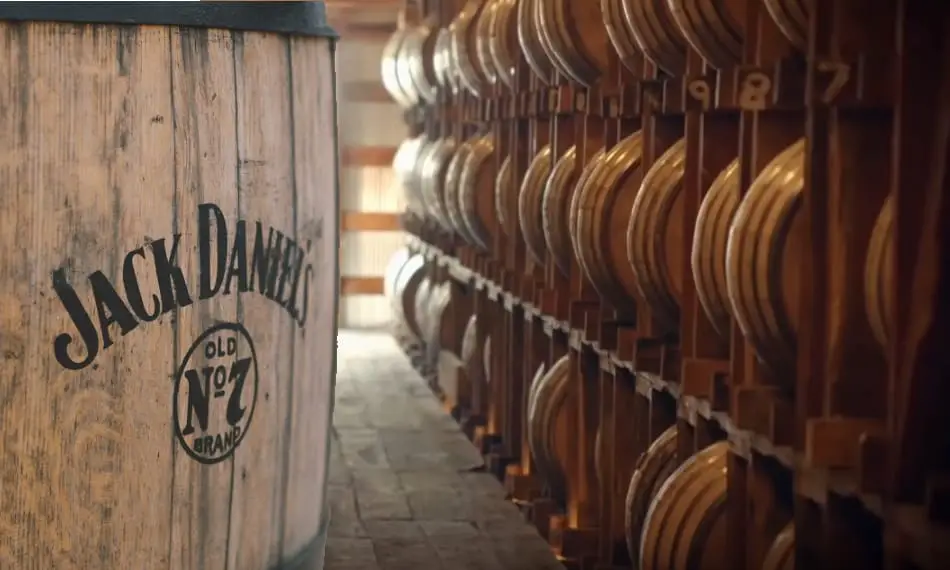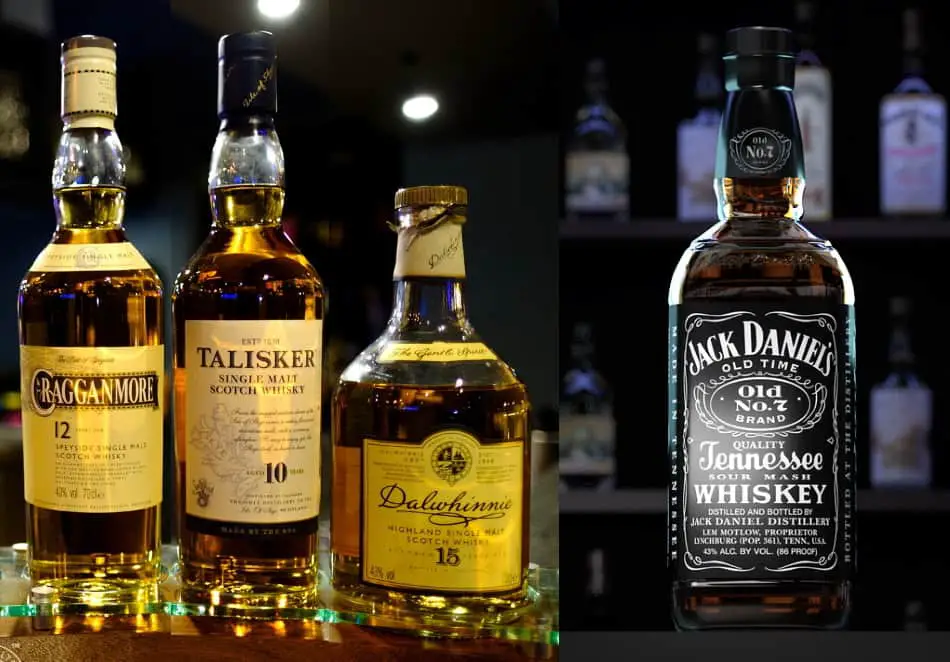The length of time a whiskey is aged is often a good indicator of how good it is. Which is why many brands advertise their whiskey’s age by putting it on the bottle. This is not the case with Jack Daniel’s, and any number on their bottles of whiskey have nothing to do with its age. That’s why I decided to look into this further and find out exactly how long Jack Daniel’s whiskeys are aged. Here’s what I found.
Jack Daniel’s whiskeys are aged between 4 – 7 years. This is because after 4 years of aging the whiskey is sampled every few months by a taster, who will determine based on its flavor if the whiskey is ready. So, Jack Daniel’s whiskeys are at least 4 years old, but some will be closer to 7 years old.
This is a unique and somewhat imprecise way of determining how long to age whiskey, but I’ll explain why I think it’s a smart move on the part of Jack Daniel’s. I’ll also explain why four to seven years of aging is long enough for Jack Daniel’s whiskeys, especially when other brands seem to age their whiskeys for far longer.

The Imprecise Length of Time Jack Daniel’s Whiskeys Are Aged
As mentioned, Jack Daniel’s uses two criteria to determine how long to age their whiskeys:
- A minimum of four years
- Whether the whiskey tastes ready
This means that all their whiskeys will be a minimum of four years old, but taste dependent, they can be closer to seven years old. And I think it’s safe to assume that it’s the standard expressions that will be closer to four years old and the better, single barrel expressions that will be closer to seven years old.
Interestingly, although we now have some idea of how long Jack Daniel’s whiskeys are aged, the answer is somewhat imprecise. This is a break from the norm because usually whiskeys are aged for a specific length of time.
However, I think that being somewhat imprecise is not such a problem and is instead a great move on the part of Jack Daniel’s.
It’s not such a problem because age statements are imprecise anyway. That’s because (with the exception of single barrel whiskeys) all bottles of whiskeys are actually a blend of many whiskeys (even single malts – they’re just blended with different versions of itself), which is necessary if it’s to have a consistent taste. Any age statement on a bottle is therefore only the age of the youngest whiskey in the blend, and the ages of the other whiskeys will remain unknown.
On the other hand, an imprecise age is a great move on the part of Jack Daniel’s for the following reason.
Many whiskeys are aged for 10, 12, 18, 21 years or longer. This is why many whiskeys that are aged for a much shorter amount of time, don’t mention it. It wouldn’t look good in comparison. Jack Daniel’s, however, have shifted the focus from aging their whiskey for a specific amount of time to aging their whiskey until it tastes ready. By doing so they have turned something they might otherwise have downplayed into something valuable and advantageous.
Is Jack Daniel’s Aged For Long Enough
As mentioned above, whiskeys are often aged for 5, 10, 12, 18, 21 years or longer. This means that, with only four to seven years of aging, Jack Daniel’s whiskeys are aged for far less time than many other whiskeys. However, this is not a problem for the following three reasons.

1. American Whiskeys Age Quicker Than Other Whiskeys
Some whiskeys age quicker than others, and American whiskeys fall into that category.
The reason for this is because although the older a whiskey is the more time it has had to seep in and out of the wood of the barrel it’s being aged in and pick up more flavors, since it’s the environment that causes the seeping in and out to happen in the first place, different environments will cause this to happen at different speeds.
Whiskey stored in environments with warmer temperatures, more humidity and seasonal fluctuations, will seep in and out the wood of the barrel more often than whiskey stored in environments with cooler temperatures, lower humidity and fewer seasonal fluctuations. Which is why they will need less time to pick up a similar amount of flavors.
So, Jack Daniel’s whiskeys, aging in Lynchburg Tennessee with seasonal fluctuations that include heat in the summer, mature much quicker than say, Scotch whiskies aging in the year-round mild, temperate climate of Scotland that take a long time to mature.
This is why different whiskeys are ready at different ages (even if more time aging would improve it), as can be seen in the following table:
| Whiskey | Time Until Ready |
|---|---|
| American whiskey | 5 – 10 years |
| Single Malt Scotch | 15 – 30 years |
2. Charcoal Filtering Does Some of The Work of Aging
Jack Daniel’s whiskeys don’t necessarily need to be aged for longer because some of what aging achieves is done by the charcoal filtering process.
Aging not only allows the whiskey to pick up flavors, it also causes some of the unpleasant compounds to be removed from it, as they’re filtered out by the wood of the barrel or evaporate through its walls. Once again, the longer a whiskey ages the more unpleasant compounds will be removed.
However, since Jack Daniel’s charcoal filter their whiskeys before aging (this is actually a legal requirement for all Tennessee whiskeys), and since they pay special attention to this process – they use 10-foot-deep tanks and small pieces of charcoal so more off-flavor molecules will be filtered out, many of the unwanted flavors and contaminants will be removed without the need for a lengthy aging process.
3. Their Target Market Is Casual Whiskey Drinkers
The last reason why it doesn’t matter that Jack Daniel’s whiskeys are not aged for longer, is because their target market is not the experienced connoisseur but rather the more casual whiskey drinker.
The fact of the matter is that while Jack Daniel’s whiskeys are sweet and smooth and have some good flavors, they’re not complex whiskeys, with lots of bold, intense flavors and layers of character and depth that the more experienced whiskey drinkers would prefer.
Even the better Jack Daniel’s whiskeys would require a longer aging period to achieve that level of complexity.
But since producing that type of whiskey is not the intention and that type of whiskey drinker is not the target audience, it doesn’t matter.
Jack Daniel’s make simple and easy to drink whiskeys that are accessible even to the non-connoisseur. They have some good flavors for the casual whiskey drinker to enjoy neat and they’re pleasant enough to blend well with the other ingredients in a cocktail or to go down smoothly in a shot.
Being aged for longer would make Jack Daniel’s whiskeys less appealing to the casual whiskey drinker, who would find them less accessible because of their greater complexity and because more time aging means more costs to be passed on to the consumer, more expensive.
And if you’re wondering why Jack Daniel’s prefer to appeal to the casual whiskey drinker and not the experienced connoisseur, I shall just point out that it’s this appealing-to-a-wider-audience approach, which has made Jack Daniel’s the best-selling whiskey brand in the world.
